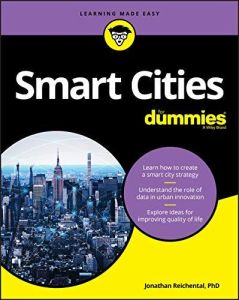Join getAbstract to access the summary!

Join getAbstract to access the summary!
Jonathan Reichental
Smart Cities For Dummies
Wiley, 2020
What's inside?
Smart cities apply people-focused technology to improve city dwellers’ quality of life.
Recommendation
Rapid change means today’s cities demand new, creative responses to the needs of the billions of people living and working in them. But most cities still apply 20th-century solutions to 21st-century problems. Learn how the smart city movement aims to change that using people-focused technology to improve city-dwellers’ quality of life. This practical, well-organized guide is a great resource for leaders, stakeholders and anyone interested in the urban future.
Summary
About the Author
Dr. Jonathan Reichental is a multiple award-winning technology and business writer whose career spans the public and private sectors.


















Comment on this summary